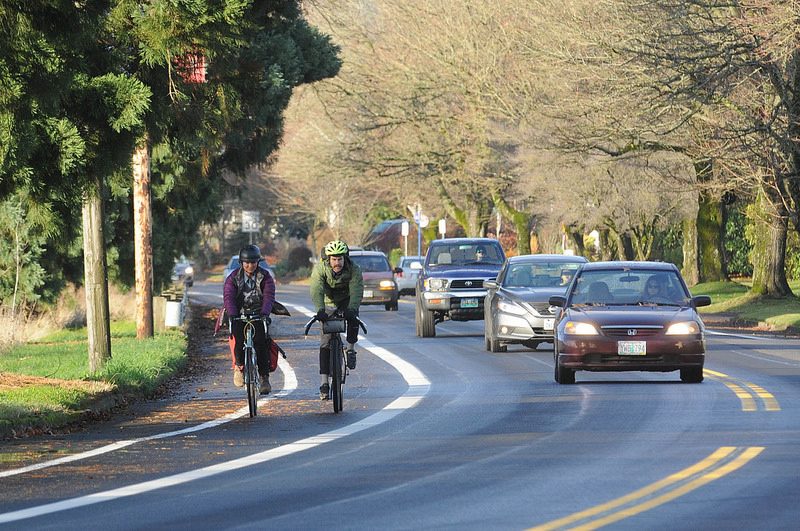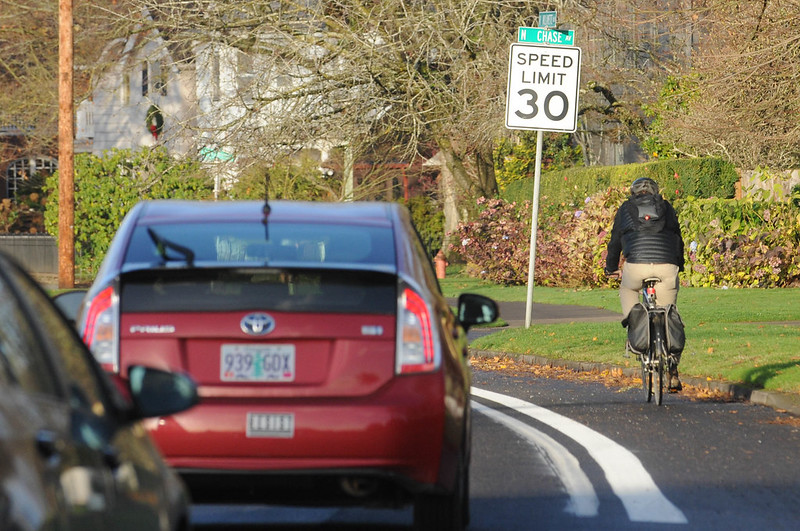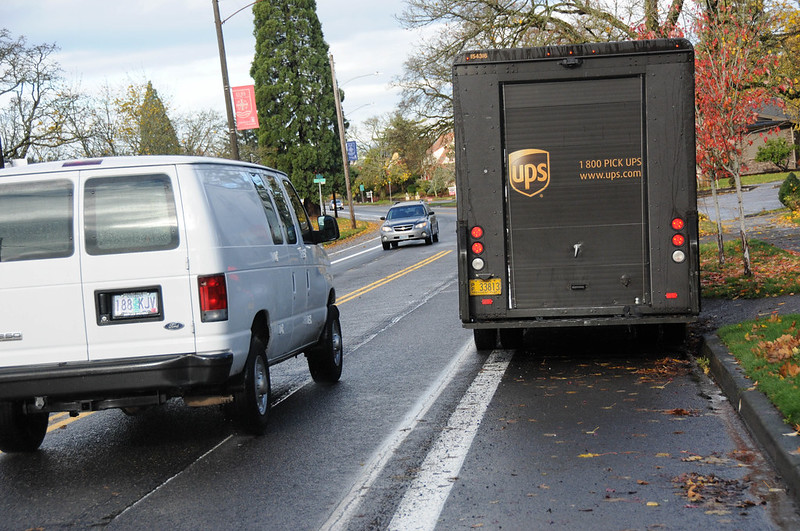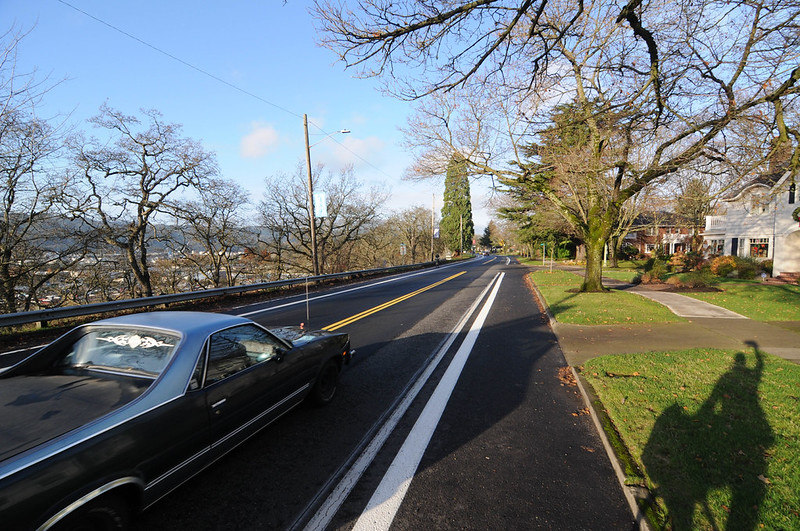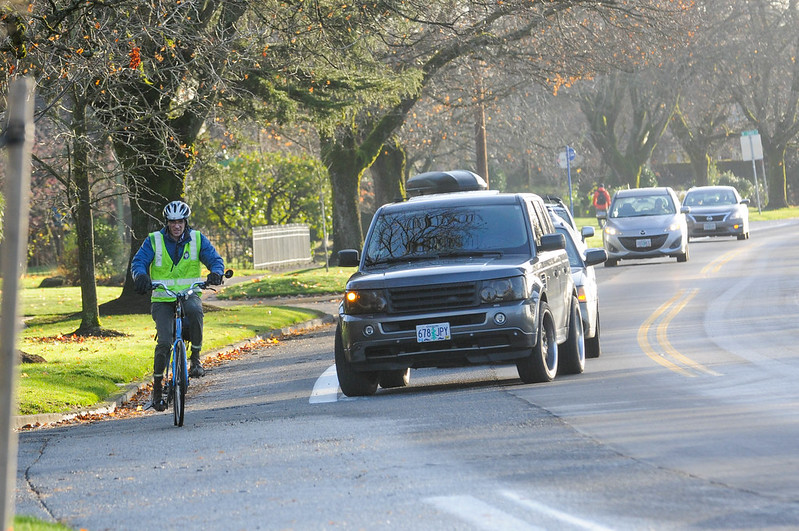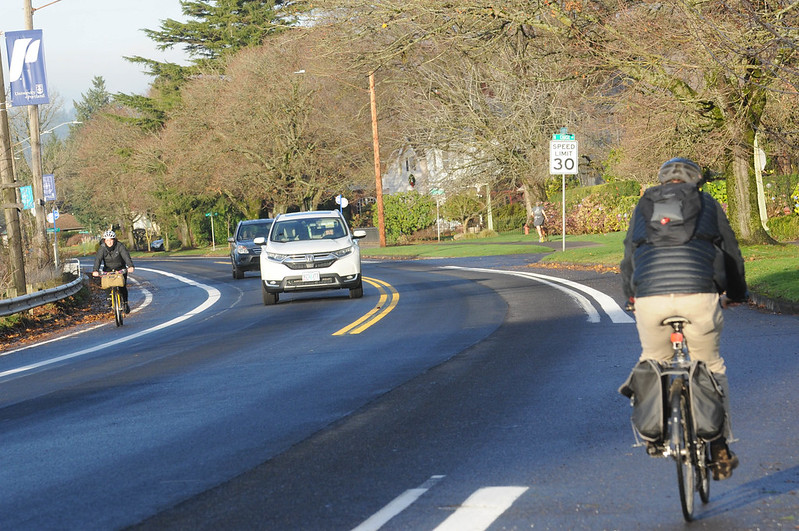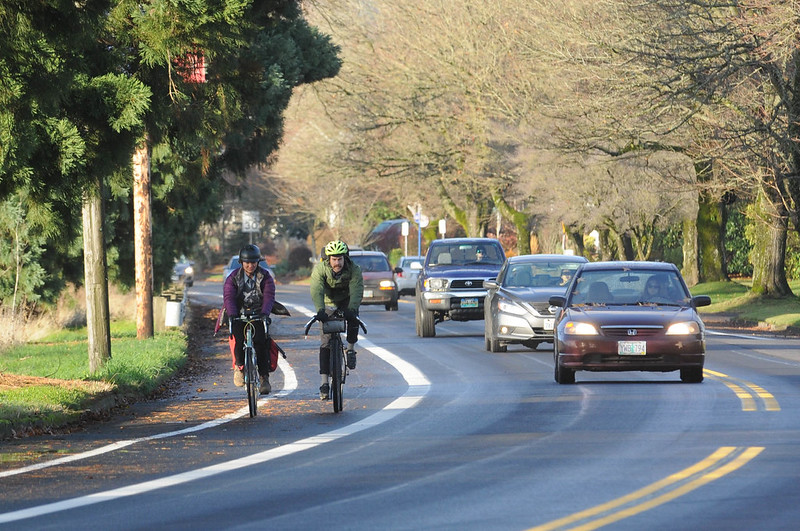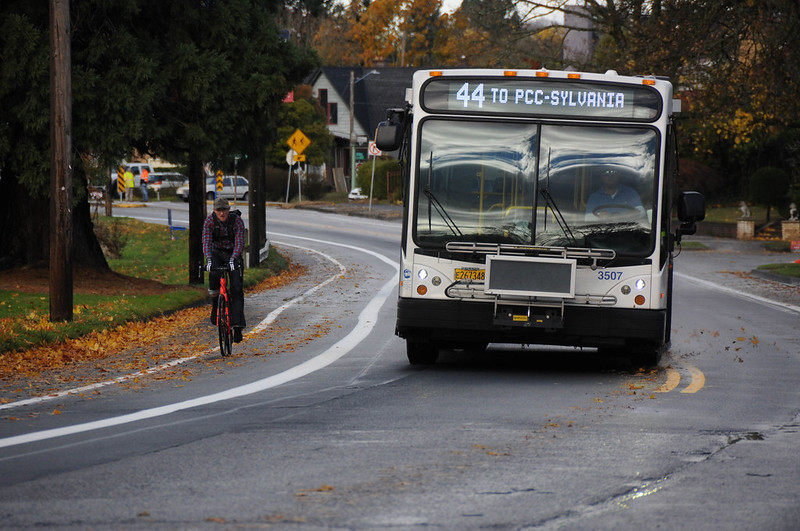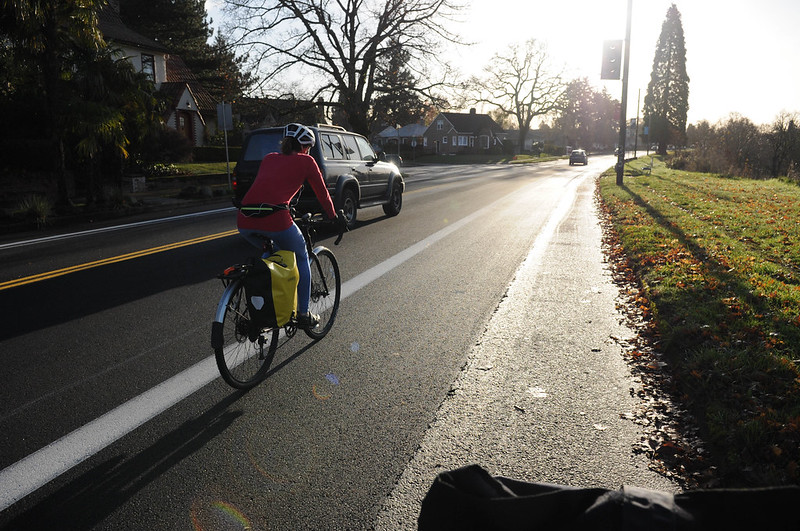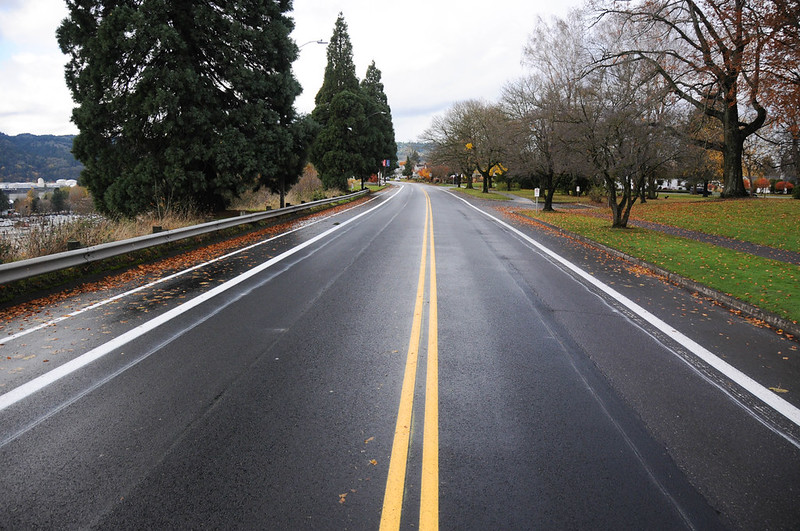
(Photos: J. Maus/BikePortland)
The Portland Bureau of Transportation is nearly done with their Willamette Blvd restriping project. This is the street where neighborhood residents seized an opportunity to improve the bikeway, galvanized tons of support, and got PBOT commissioner Dan Saltzman to back them up.
The result is a redesigned cross-section between Rosa Parks and Woolsey (Columbia Park) that has shifted the centerline to the north, no longer allows on-street parking, has buffered bike lanes in both directions, and has a much wider bikeway in the southbound direction. The new striping was planned for completion last week but rain has pushed things back a bit. As of this morning, it appears to be finished except for the outer buffer stripe on the southbound bike lane and on some portions of the northbound one.
I’ve been watching the work progress and have driven and ridden on it several times. Here are my initial observations…
Both sides of the street feel very different for bicycle riders.
Northbound (residential side)
In the northbound direction, you no longer have that cushion of space that used to be used for on-street auto parking. The nice thing about the old design was that the parking lane was rarely used and offered lots of extra space to ride in. The new bike lane is curb-tight. It will feel much better when the buffer strip goes in (and would feel even better if it had some physical protection, but I digress).
While I miss the extra space offered in the old design when no parked cars were present, I like the predictability of having no parking and would rather ride next to a curb than a parked car any day of the week.
So far, PBOT has only done one bicycle symbol each block (if that) and I didn’t notice any special “no parking” signs or markings. I seriously hope there’s more signage/markings and enforcement/education when the project is completed. Here’s why: I’ve seen two people parked in the bike lane so far. When they do, there’s zero extra room to get by because the bike lane is only 6.5-feet wide (with a 1.5-foot buffer). I saw a UPS driver parked in the bike lane for several minutes. And a woman attending a function at a church also parked in the new bike lane. The woman could barely get out of her car with other drivers flying by at around 30 mph. There’s only one standard lane going northbound, so drivers can’t swerve over too much or they’ll slam into oncoming traffic.
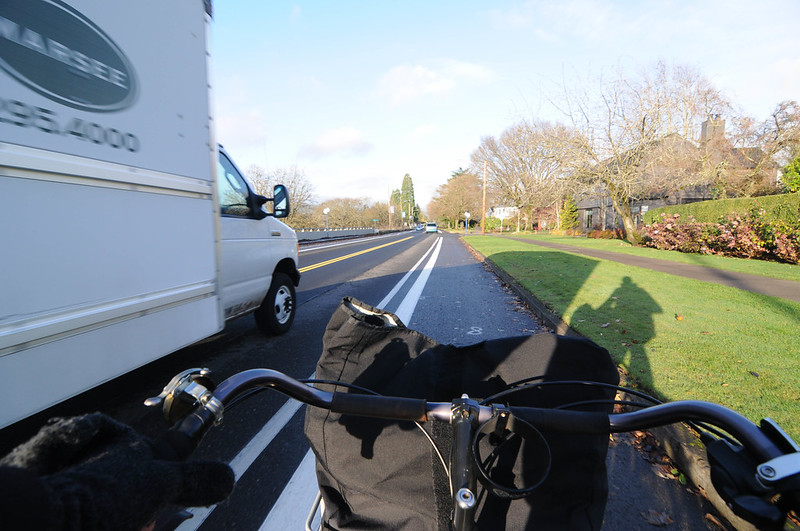
Advertisement
Another shift has to do with cross-traffic. In the past when people wanted drive onto Willamette from a side street, they could peek out into traffic and only encroach into the lane used for parking. This gave them several feet before entering the bike lane. Now with the bike lane curbside, people have to make sure they stop well short of the intersection — making it hard to see oncoming traffic — or they’ll block the bike lane.
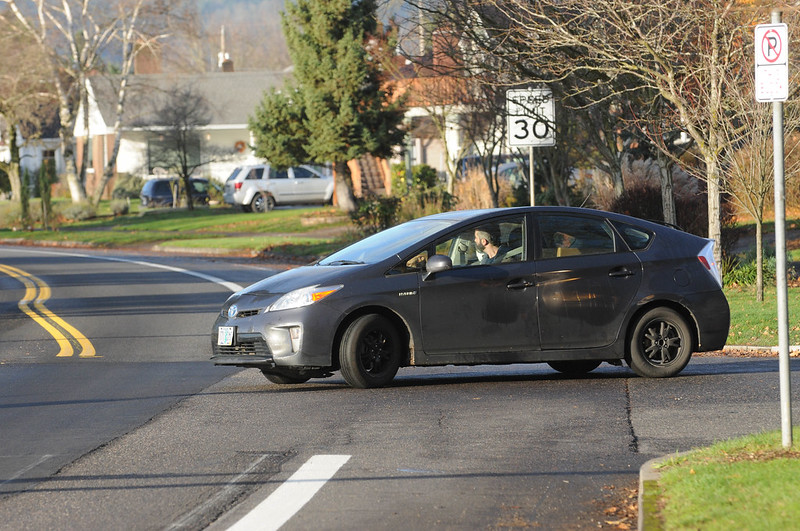
Speaking of blocking the bike lane. Peak hours are bonkers on Willamette. It has become such a thoroughfare and people really drive dangerously. This morning I saw someone trying to turn left onto Woolsey from Willamette and instead of waiting behind them, two drivers swerved into the southbound bike lane to go around (photo below). This is another reason having some sort of physical protection is so important. We cannot have people thinking bike lanes are for anything other than cycling. Ever.
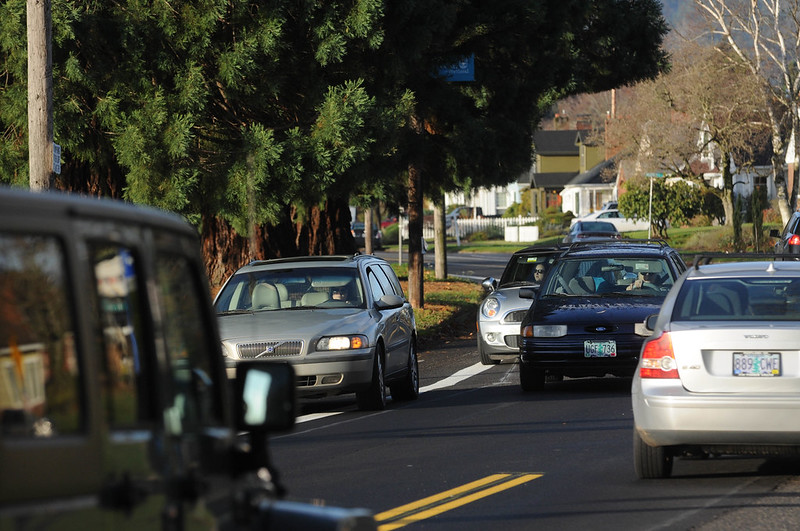
Southbound (bluff side)
Oh what a relief! With 12 feet of space to use, the new southbound bikeway is a huge improvement over the claustraphobic and stressful design of old. And once the outside buffer line is striped, it will feel even better. Also, if not for this extra space, people would be riding through piles of leaves and big puddles right now.
Being able to breathe easily on the bluff side of Willamette is a great feeling. Another thing I noticed is that now bicycle users have a passing lane. With Willamette being a popular connection to training and recreational rides in the West Hills (and beyond), this is an important benefit. In the past it was dicey to pass a slower rider. I’d have to triple-check my shoulder, watch for potholes, and enter into auto traffic going 30+ mph. Now I just slow down a bit, ding my bell, smile, and get by without much fuss.
Overall, I’m very happy to see these changes and I’m impressed that PBOT made such quick work of it. The fact that they decided to prioritize mobility over free auto parking without much public process at all is nothing short of extraordinary.
However, the street is still more stressful than it should be. With only paint as protection from motor vehicle users, ever-increasing auto volumes, and a speed limit of 30 mph (lowered recently from 35, but still deadly), I don’t think we’ll be seeing a lot of young people and families riding here. That might change if/when PBOT comes back and adds some type of physical barrier in the new buffer zones. We’ll see.
Have you ridden Willamette lately? What have you seen? What do you think of the new striping.
— Jonathan Maus: (503) 706-8804, @jonathan_maus on Twitter and jonathan@bikeportland.org
Never miss a story. Sign-up for the daily BP Headlines email.
BikePortland needs your support.
